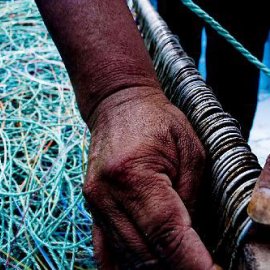The Outlaw Ocean
-
English
-
ListenPause
I’m Peter Neill, Director of the World Ocean Observatory. I sit on the Planning Commission of my small town in Maine where we have no ordinances or zoning, and we do not plan. It is an ideologically driven mind-set that argues that government has no role to play in governance. What we do primarily is to get ourselves in trouble, by applying situational, ineffective solutions to the complaints of neighbor against neighbor that would in any other community be covered by some community-accepted master plan and reasonable regulation and enforcement. This behavior is analogous to many situations we find along watersheds and in river systems, the coastal zone, and the ocean beyond national jurisdiction. In a stunning series of investigative stories entitled “The Outlaw Ocean” by Ian Urbina in the New York Times, the dark side of activities in the deep sea were described in four stories of indifference to any international restrictions on irresponsible commercial fishing, of piracy, slavery, and murder. Urbina and the New York Times are to be congratulated for the courage to pursue these harsh, very real abuses and to give ample space for their publication and distribution. Those of us who live and work ashore may suspect these things, but to see them revealed in their stark reality wherein responsibility and disrespect for human life is without any import or regard is an awakening to an immediate need for some kind of useful and humane order. The four-part “The Outlaw Ocean” provides a stunning and disturbing look at crime at sea. Part One, “Stowaways and Crimes Aboard A Scofflaw Ship” describes the case of two South African men who stowaway aboard the fishing ship Dona Liberta, a boat notorious for cheating its crew and disregarding the laws of the sea. Part Two, “Murder At Sea: Captured on Video But Killers Go Free” shows graphic video content of four unarmed men being gunned down in the water in the hopes that by circulating it broadly it may be determined who was involved so that the killers may be brought to justice. Part Three, “Sea Slaves: Forced Labor for Cheap Fish” exposes the rampant human rights abuses at sea as men are forced into servitude aboard fishing fleets that provide the bulk of the world’s pet and livestock feed. Part Four, "A Renegade Trawler, Hunted for 10,000 Miles by Vigilantes," reports on a vigilante ship during the pursuit in the South Atlantic. This final installment also shows how difficult it is to enforce law on the high seas but how essential it is that we try. These are not easy to read, and the video is very disturbing. But this is invisible reality made visible and we are compelled not to let its content be dismissed or ignored. Every major ocean organization is engaged in conservation strategies like marine protected areas or campaigns against shark-finning or plastic – all real, all important, all necessary to solve through information and action. But where are the petitions against social injustice at sea? Who is standing up for refugees turned enslaved fishermen? Who will advocate against the killers of unarmed men left nameless and dead in the ocean? Only Sea Shepherd is portrayed here engaging in a real-time, dangerous battle with a renegade fishing vessel whose captain is willing to lose both his crew and his ship rather than reveal the extent of his illegal fishing or the owners to whom he reports. Ian Urbina suggests that there are more such reports coming, and I certainly hope so. But like all investigative reporters, he must be careful, certain of his facts and sources, and courageous in his belief that these revelations matter and will be addressed by authorities and governments who plead lack of resources and wrap themselves in policy that is too little too late. The Outlaw Ocean is where the real action is, not the local disputes among neighbors. There is where real lines need to be drawn, placed on real latitudes and longitudes, where quotas can be monitored, where the rules can be enforced, and the community of fishers can be protected. Investigative reporting is only as good as the reaction to the investigation, not in journalism prizes that Urbina will surely win, but in the rectification of wrong and the affirmation of right practice on the high seas. We will discuss these issues, and more, in future issues of World Ocean Radio.
A recent series of investigative stories entitled "The Outlaw Ocean" by Ian Urbina of the New York Times exposes the dark side of the deep sea, describing real abuses, crime and violence in international waters. In this episode of World Ocean Radio, host Peter Neill summarizes the four-part “Outlaw Ocean” series, praising Urbina’s work to educate the public by exposing the labor, human rights, and environmental abuses occurring out of sight, on the high seas.
About World Ocean Radio:
Peter Neill, Director of the World Ocean Observatory and host of World Ocean Radio, provides coverage of a broad spectrum of ocean issues from science and education to advocacy and exemplary projects. World Ocean Radio, a project of the World Ocean Observatory, is a weekly series of five-minute audio essays available for syndicated use at no cost by college and community radio stations worldwide. A selection of episodes is now available in Portuguese, Spanish, French, Swahili, and Mandarin, enabling us to reach 75% of the world's population. For more information, visit WorldOceanObservatory.org/world-ocean-radio-global.
Image Credit:
Maximilian Hirschfeld 2010 | Marine Photobank
- Login to post comments



